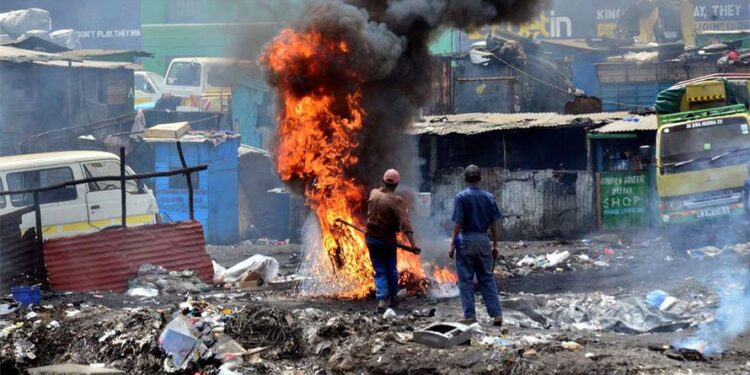Ideas & Debate
Why industry must be on the front line of air pollution fight
Wednesday, June 5, 2019 20:15
By KAMUGI NDERITU |

Four years ago, the 2030 Agenda for Sustainable Development was adopted by all United Nations member-states. At the core of the agenda were the sustainable development goals (SDGs), with one of them — SDG 13 — calling for urgent action to combat climate change and its impacts.
The evidence of the impacts of climate change is becoming increasingly hard to ignore and if some of the examples are anything to go by, we are surely walking a tight rope. December 2018 went down as the hottest month ever recorded in Australia; wildfires are wreaking havoc and occurring at a higher frequency in California; last year, India experienced the worst floods in 100 years and closer home, cyclone Idai claimed over 1,000 lives in Mozambique.
These are just but a few examples of the catastrophic effects of climate change. A lot more has been recorded in the past few decades.
In Kenya, one of our biggest challenges has been the unpredictable weather patterns that have resulted in prolonged droughts, floods and unreliability in the two rainy seasons that our forefathers swore by for hundreds of years. It is no doubt that these changes are threatening our quality of life.
According to the United Nations Development Programme (UNDP), the annual average economic losses from climate-related disasters amount to hundreds of billions of dollars.
This not only affects individuals and communities, but businesses as well. This is through a rise in insurance costs, physical damage to property, disruption of the supply chain through resource scarcity, rise in costs of electricity and transport.
One of the major contributors to climate change is air pollution caused by industrial operations and the burning of fossil fuels such as diesel, kerosene and biomass, which release carbon, methane and other greenhouse gases to the atmosphere.
To put this into perspective, according to a report by the UN Environment (Unep), air pollution is the single biggest environmental health risk — annually, it causes seven million deaths prematurely globally.
We can no longer afford to downplay these effects. The theme of this year’s World Environment Day (June 5), ‘Beating Air Pollution’, is a timely call to action for all stakeholders, including governments, industries, environmentalists and communities across the globe to come together in an effort to combat this menace. This will be done by reducing our carbon footprint and exploring renewable energy as we strive to improve the quality of the air we breathe.
Taking action, nevertheless, is hardly a one-size-fits-all statement, as cities, countries and businesses are impacted by climate change in different ways.
It takes on many forms such as; water and energy management, environmental conservation and habitat restoration, sustainable manufacturing and production initiatives, just to name a few. However, focusing on one or two initiatives where a business makes the biggest environmental impacts through its operations is key to realising real time and meaningful results.
Clean and quality air has to be a priority. As businesses in the manufacturing sector, it is a commitment we ought to take seriously. We have a great responsibility of reducing air pollution in our operation sites, across our value chains and in the communities we work in.
We can achieve this by investing in clean and renewable energy sources such as wind and solar, adopting energy-efficient practices and minimising our direct and indirect emissions. Indeed, cleaner production not only reduces the environmental impacts of the business, but also reduces operating costs, helping us run a more sustainable business.
Kenya Breweries (KBL), for instance, runs an agile supply chain that focuses on energy and water use and its implication to the environment. We have ensured that there is a robust tactical and strategic process that drives performance towards reduction in energy and water use. It is our strategic intent to continue investing capital and applying science to innovate and re-engineer our processes for sustainability.
Most importantly, we must recognise that trees play a crucial role in mitigating the impacts of climate change. As António Guterres, the UN Secretary General said ‘forests are the lungs of our planet.’ If they stop breathing, so do we.
Trees are not just for aesthetic value, each of them plays an important and direct role in our ecosystem. This is by absorbing carbon dioxide, filtering the air we breathe and trapping harmful particles from the atmosphere.
At KBL we have over the years placed special focus on environmental programmes such as tree planting initiatives, and through partnerships, have planted and nurtured over one million tree seedlings, with a success rate of 85 per cent.
This is a good example that as a business, there’s a lot more we can do to address environmental degradation and make a contribution to fighting air pollution.
I implore my fellow industry players to renew their commitment to achieving SDG 13 — urgent action to combat climate change by reducing their environmental impact and putting environmental conservation at the heart of their operations.
As we celebrate the World Environment day this year, we must not relent in our efforts to restore our universe to its former glory.
Nderitu is the Supply Chain Director at Kenya Breweries Limited.
Kenyan Business Feed is the top Kenyan Business Blog. We share news from Kenya and across the region. To contact us with any alert, please email us to [email protected]











